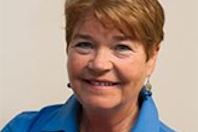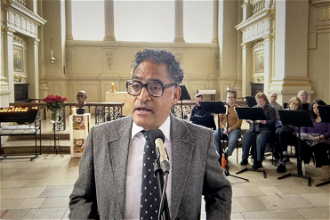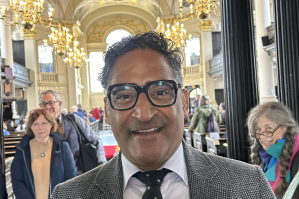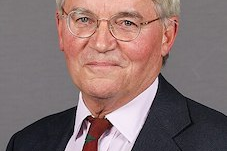Trial of Archbishop Oscar Romero's alleged killer has begun
The trial in absentia, of the alleged killer of Archbishop Oscar Romero, began in the district court in Fresno, California, yesterday.
Archbishop Romero, 61, was shot on 24 March 1980 as he celebrated Mass in the Chapel of Divine Providence in El Salvador's capital city San Salvador. The church was so crowded, many attendants had to stay outside listening to loudspeakers. The crime was well documented - there are sound recordings, photos, and dozens of witnesses - yet to date no one has been held accountable for this death.
The civil lawsuit against retired Salvadorian Airforce Alvaro Rafael Saravia was filed by the Centre for Justice and Accountability on behalf of Romero's surviving family, his two brothers: Tiberio, 77, and Santos, 74. Tiberio said: "We try to give testimony to our brother's life and to live our lives as best we can, with humility and honesty," Saravia, a former captain in the Salvadoran military, was the right-hand man of Salvadoran death squad leader Roberto D'Aubuisson.
Witnesses in the four-day trial will include Bishop Thomas Gumbleton, a founder of Pax Christi; the Rev John Fife, one of the founders of the Sanctuary Movement; Maria Julia Hernandez, head of the Human Rights Office of the Archdiocese of San Salvador and Jesuit Fr Jon Cortina. Robert White, US Ambassador to El Salvador at the time of the assassination, will testify via a videotaped deposition.
The case is being brought under two federal statutes, the 1789 Alien Tort Claims Act, and the more recent Torture Victim Protection Act of 1991, which allow suits against foreign nationals in the United States for summary killings and torture committed abroad. The UN Truth Commission and the Inter-American Commission on Human Rights have both already concluded, after separate investigations, that Saravia was actively involved in planning and carrying out the assassination. He was detained in the United States in 1987 when Salvadoran prosecutors sought his extradition. But the Salvadoran Supreme Court later withdrew the extradition request in a decision denounced as "dubious and politically motivated" by church and human rights groups. He was released from federal prison on bond in 1988 and has since lived in California and Florida.
Juan Carlos Cristales, Executive Director of El Rescate in Los Angeles, one of the leading organizations in America that defends the rights of Central Americans, said: "The assassination of Archbishop Oscar Romero was one of the most shocking atrocities in our recent history. If that crime is allowed to go unpunished, then any crime is conceivable. It is particularly offensive to Salvadorans that men who were responsible for those crimes are allowed to live openly and with impunity in the United States, when so many genuine refugees were kicked out. The failure to bring to justice those most responsible for the crime has weakened the whole structure of our rule of law."
The current Archbishop of San Salvador, Monsignor Fernando Saenz Lacalle, has welcomed the case on the ground that it could uncover facts surrounding Romero's murder that will help establish his martyrdom. Romero has been nominated for recognition by the Vatican as a saint by the US Bishops Conference. Bishop Kieran Conry, who is a trustee of CAFOD, welcomed the news of the trial.
He told the London-based Catholic Herald yesterday: "This is a reminder of a very sad episode. It is good that Oscar Romero's name is being kept alive. He was a martyr for justice. I hope this case serves to further his cause."
Claire Dixon, head of CAFOD's Latin America section which worked closely with the archbishop said: "This is a hugely significant event - not only for those seeking his canonization - but for the relatives and friends of more than 60,000 people, including priests and nuns, who were murdered by El Salvador's death squads. Their killers have got off completely scot-free and a 1993 amnesty means they can never be tried in El Salvador. Many immigrated to America. This is a landmark case because if Saravia is found guilty it will mark a new era for justice in the USA and all past members of the death squads living in America could face prosecution. "We haven't forgotten the crimes against humanity of World War Two and yet so many thousands of people in El Salvador have never seen these terrible crimes in their country acknowledged. Healing cannot begin until justice is seen to be done."
Ms Dixon praised the tireless efforts of the human rights organizations that spent years working on the case. She said a key witness, Maria Julia Hernandez, head of the Human Rights Office of the Archdiocese of San Salvador has close links with CAFOD and gave their annual Paul VI lecture in 2000.
She said: "It is a strange twist of fate that the US government actually trained the elite battalion that carried out many of these killings - including the Jesuits in 1989. Now America may be the place where they finally meet justice."
Ms Dixon said it was too late for death squad chief Roberto D'Aubuisson, who died of throat cancer five years ago, but she said: "He is said to have expressed remorse on his deathbed. He came from a very devout Catholic family opposed to the regime. One of his aunts and a sister were nuns."
Bruce Kent, former president of Pax Christi who worked with the Archbishop said: "Romero is a Christian hero. I believe that he should be canonized. He gave his life for his faith."
Pat Gaffney, general secretary of Pax Christi welcomed news of the trial saying: "This is an opportunity to bring back memories which allow healing, reconciliation and create a framework for justice." Archbishop Romero was a giant in the struggle for human rights in El Salvador in the late 1970s. From that time through the end of the civil war in 1992, the military and right-wing death squads killed as many as 75,000 civilians, according to the UN Commission on the Truth for El Salvador and other reliable reports.
The Archbishop became the leading voice for victims and the poor through his weekly radio homilies, broadcast throughout the country, which captivated Salvadoran audiences and called for an end to military repression. Romero regularly denounced human rights abuses being committed by the Salvadoran armed forces and death squads and was viewed by the Salvadoran far right as a threat to its political agenda. He said in one broadcast: "The church would betray its own love for God and its fidelity to the gospel if it stopped being . . . a defender of the rights of the poor . . . a humanizer of every legitimate struggle to achieve a more just society . . . that prepares the way for the true reign of God in history.."
He once wrote to President Carter: "You say that you are Christian. If you are really Christian, please stop sending military aid to the military here, because they use it only to kill my people." Days before his murder Archbishop Romero told a reporter, "You can tell the people that if they succeed in killing me, that I forgive and bless those who do it. Hopefully, they will realize they are wasting their time. A bishop will die, but the church of God, which is the people, will never perish."
The night before his assassination, Romero addressed his homily to government soldiers and pleaded: "In the name of God, in the name of these suffering people whose cries rise to heaven more loudly each day, I implore you, I beg you, I order you: Stop the repression."
Archived story - Nov 2004





















